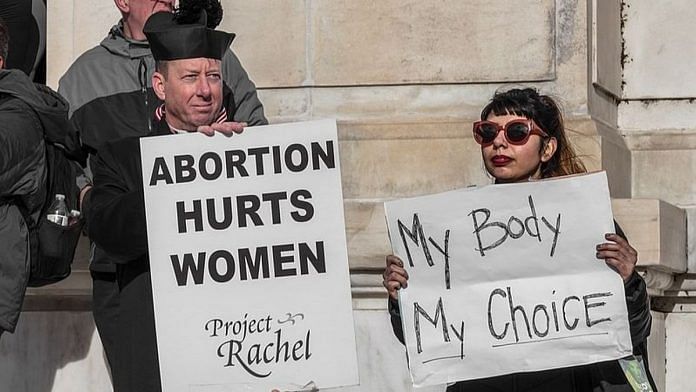New Delhi: The US Supreme Court has signalled that it may overturn a 50-year-old landmark ruling affording abortion rights to women, triggering a massive debate on the matter.
The court is currently hearing a case — ‘Dobbs v Jackson Women’s Health Organization’ — that challenges a Mississippi law that seeks to prohibit abortions beyond 15 weeks of pregnancy except on grounds of a medical emergency.
The law, called the Mississippi’s Gestational Age Act, 2018, has been challenged by the Jackson Women’s Health Organization, the state’s only abortion clinic.
The Act goes against a historic judicial ruling in 1973 in the Roe v Wade case, permitting termination of pregnancy up to the ‘point of viability’.
The ‘point of viability’ means a stage where the foetus can survive outside the mother’s womb, before which abortion is generally permitted. The question before the US Supreme Court is whether “all pre-viability prohibitions” on abortion stand the test of law.
The clinic first challenged the Mississippi law in 2018 in Jackson, Mississippi, when a federal judge ruled against the state. The case then went to a Court of Appeals in 2019, which also ruled against the state. The state then moved the Supreme Court, which agreed to hear the matter in May this year.
Earlier this month, Solicitor General for the State of Mississippi Scott G. Stewart had opened his argument insisting that the court overturn the decisions in two long-standing US Supreme Court cases — the 1973 Roe v Wade decision, and a 1992 ruling in Planned Parenthood v Casey — as they continue to “haunt” the country.
ThePrint looks into the cases that safeguard women’s right to abortion in the United States, and the contention raised before the US Supreme Court now.
Also Read: Why India’s law on abortion does not use the word ‘abortion’
‘Right to reproductive choice’ vs ‘interest of the state’
The 1973 case of Roe v Wade dealt with the constitutionality of a Texas law making abortion illegal except by a doctor’s orders to save a woman’s life. The court recognised that a woman’s right to terminate her pregnancy was constitutionally protected.
In a 7-2 split, the US Supreme Court held that the 14th Amendment to the Constitution contained a ‘right to privacy’ that protected a woman’s right to have an abortion.
However, this right was balanced against the state’s interests in protecting women’s health and the ‘potentiality of human life’, with the relative weight of such ‘interests’ varying throughout pregnancy.
A state law that broadly prohibited abortion without respect to the stage of pregnancy would violate such a right to privacy, the court said.
According to the decision in Roe, restrictions on pregnancy depend on the ‘stage’ of pregnancy, understood as trimesters (three months each).
In the first trimester, the state may not regulate the abortion decision and leave it to the woman and the attending physician, the court said. In the second trimester, the state may impose regulations that are “reasonably related to maternal health”, it added.
In the third trimester, also known as the “point of viability”, the court left it to the states to “regulate abortions or prohibit them entirely”. It provided an exception for danger to a mother’s health and life.
In 1992, the court pronounced its decision in Casey, where it upheld a woman’s right to abortion, but narrowed the scope in Roe’s decision. The court held that states could regulate and interfere during any of the three trimesters when it came to abortion, provided it was not an “undue burden” on the woman.
Ever since the Casey verdict, abortions in the US have been subject to the guidelines laid down in both cases.
Gestational Age Act
The case before the court contended that the Mississippi Act creates “unconstitutional barriers to the right to access safe, legal abortion”, and “overrides” the landmark decisions of the US Supreme Court (Roe and Casey) as it “seeks to deprive women of the right to reproductive choice”.
It also contends that the state of Mississippi has, over the last two-and-a-half decades, placed “unwarranted burdens on women that seek to avail abortion services”.
It challenges “legal restrictions” on women seeking abortion in Mississippi like the TRAP (Targeted Regulations of Abortion Providers) scheme — a highly restrictive licensing system for abortion clinics, in stark contrast to other healthcare institutions — as well as the ‘two-trip requirement’, which mandatorily requires a woman to visit the clinic two times before an abortion.
Other challenges include a ban on telemedicine for abortion services and the mandatory 24-hour delay even after receiving state approval.
The Supreme Court will also consider the constitutionality of a six-week ban, which restricts abortion once a heartbeat has been detected, possible within six weeks of pregnancy.
The US Supreme Court now comprises six conservatives on a bench of nine, who have all expressed disapproval of pro-abortion laws. With two-third of the bench now being ‘pro-life’, there is a will and the requisite numbers to overturn the landmark cases.
The Texas Heartbeat Bill
The Mississippi law is not the only one that has reignited the debate on reproductive choice, with opposition to the Texas’ Heartbeat Bill restricting pregnancies to six weeks no different.
The Texas law is especially problematic because women may not know they are pregnant until much later, which denies them their right to terminate a pregnancy. The Texas law has also been challenged before the Court of Appeals, and will next be heard on 7 January.
Akshat Jain, a first-year student of law at NLU, Delhi, is an intern with ThePrint.
(Edited by Gitanjali Das)
Also Read: Alabama passes harshest anti-abortion law in US, effectively banning procedure



